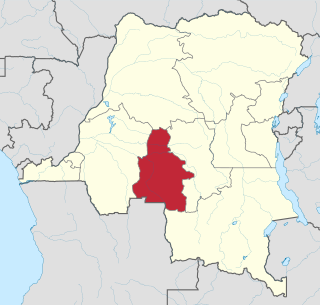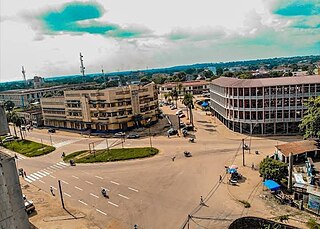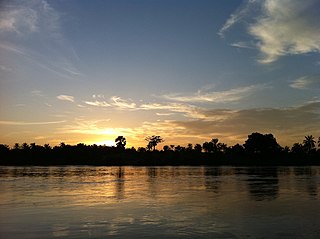
Ground transport in the Democratic Republic of the Congo (DRC) has always been difficult. The terrain and climate of the Congo Basin present serious barriers to road and rail construction, and the distances are enormous across this vast country. Furthermore, chronic economic mismanagement and internal conflict has led to serious under-investment over many years.

The Democratic Republic of the Congo, also known as the DR Congo, the DRC, or Congo-Kinshasa, is a country in Central Africa. By land area the Congo is the second-largest country in Africa and the 11th-largest in the world. With a population of around 109 million, the Democratic Republic of the Congo is the most populous Francophone country in the world. The national capital and largest city is Kinshasa, which is also the economic center. The country is bordered by the Republic of the Congo, Central African Republic, South Sudan, Uganda, Rwanda, Burundi, Tanzania, Zambia, Angola, the Cabinda exclave of Angola, and the South Atlantic Ocean.

Kasaï-Occidental was one of the eleven provinces of the Democratic Republic of the Congo between 1966 and 2015, when it was split into the Kasaï-Central and the Kasaï provinces.

Kisangani is the capital of Tshopo Province, located on the Congo River in the eastern part of the central Congo Basin in the Democratic Republic of the Congo. It is the country's fifth most populous urban area, with an estimated population of 1,602,144 as of 2018, and the largest of the cities in the tropical woodlands of the Congo.

The Ituri conflict is an ongoing low intensity asymmetrical conflict between the agriculturalist Lendu and pastoralist Hema ethnic groups in the Ituri region of the north-eastern Democratic Republic of the Congo (DRC). While the two groups had fought since as early as 1972, the name "Ituri conflict" refers to the period of intense violence between 1999 and 2003. Armed conflict continues to the present day.

Bundu dia Kongo, known as BDK, is a new religious movement with a political and cultural agenda that is associated with the Kongo ethnic group. It was founded in June 1969 but officially in 1986 by Ne Muanda Nsemi, who was the group's leader until his death and is mainly based in the Kongo Central (Bas-Congo) province in the Democratic Republic of the Congo.

The Kivu conflict is an umbrella term for a series of protracted armed conflicts in the North Kivu and South Kivu provinces in the eastern Democratic Republic of the Congo which have occurred since the end of the Second Congo War. Including neighboring Ituri province, there are more than 120 different armed groups active in the eastern Democratic Republic of Congo. Currently, some of the most active rebel groups include the Allied Democratic Forces, the Cooperative for the Development of the Congo, the March 23 Movement, and many local Mai Mai militias. In addition to rebel groups and the governmental FARDC troops, a number of national and international organizations have intervened militarily in the conflict, including the United Nations force known as MONUSCO, and an East African Community regional force.
Idiofa Territory is an administrative area in the Kwilu Province of the Democratic Republic of the Congo (DRC). The capital is the town of Idiofa.
The Lubue River runs from south to north through Idiofa territory, Kwilu province, Democratic Republic of the Congo. Near its origin in the south, where the Musanga River enters from the left, it is a small, winding river perhaps 12 metres (39 ft) wide obstructed by rocks and rapids. It becomes navigable at Mulasa, and below this point meanders through a very wide and wooded valley. It enters the Kasai near the town of Dibaya Lubue.

The Allied Democratic Forces insurgency is an ongoing conflict waged by the Allied Democratic Forces in Uganda and the Democratic Republic of the Congo, against the governments of those two countries and the MONUSCO. The insurgency began in 1996, intensifying in 2013, resulting in hundreds of deaths. The ADF is known to currently control a number of hidden camps which are home to about 2,000 people; in these camps, the ADF operates as a proto-state with "an internal security service, a prison, health clinics, and an orphanage" as well as schools for boys and girls.
Events in the year 2020 in the Democratic Republic of the Congo.
Events in the year 2021 in the Democratic Republic of the Congo.
Events in the year 2021 in the Republic of the Congo.

Throughout 2022, floods affected most of Africa, killing over 2,100 people. The worst affected country was Nigeria, with over 610 deaths.

From 12 to 13 December 2022, heavy rains left roads, infrastructure and many neighborhoods underwater or destroyed in Kinshasa, the Democratic Republic of the Congo's capital.
Events of the year 2023 in the Democratic Republic of the Congo.
The 2023 African Great Lakes floods are floods in April and May 2023 that have killed hundreds of people in the Democratic Republic of the Congo, Rwanda and Uganda.
Events of the year 2024 in the Democratic Republic of the Congo.

On 12 June 2024, the ship HB la Saintet sank in the Kwa River, a tributary of the Congo River in the Democratic Republic of the Congo, killing at least 86 people including 21 children.











